Hard water is not so much a people issue (studies indicate that high mineral levels are more likely a health benefit than hazard), it’s just a plumbing nuisance. Cold water isn’t a problem, but when water gets heated, carbon dioxide in the water evaporates and calcium carbonate salt deposits get left behind. So it’s the appliances that deal with warm or hot water – dishwashers, washing machines, coffee makers, tea kettles – that build up chalky limescale deposits.
Brute force won’t win against stubbornly clingy mineral scale, but a little chemistry can outsmart it. A mildly acidic solution dissolves the tough white deposits, making them disappear into clear water. Rinse, and you’re good as new.
Lemon juice or vinegar will do the trick, but a handy white powder called citric acid is cheaper than lemon juice and doesn’t have the residual smell of vinegar.
If I could grow anything, I’d already have citric acid in my household arsenal for canning my homegrown harvest. Citric acid is used in canning to lower the pH to microbe-inhibiting levels, without the added flavor of vinegar or lemon juice.
It’s also used as a preservative in many commercial food products from pre-cut produce to ice cream, and as a tart flavoring in soft drinks and many food products. And because of its water-softening effects, citric acid is also found in many household cleaners and detergents.
Which brings us back to our little home demonstration: kettle cleaning.
In a coffee maker, the scale is often hidden with the heating element, but in an electric kettle you see the build-up every time you open the lid to fill it. Even though the filter prevents any loose mineral crustiness from pouring out, it’s unappetizing.
I use vinegar as a softener in my washing machine (it’s also great as a deodorizer boost for stinky laundry). But vinegar has a strong smell and taste I don’t want in my teakettle. Citric acid leaves no trace.
Ball sells a 1/2-pound jar of food-grade citric acid for canning ($5 on Amazon), or you can buy a 1-pound bulk bag for less than $10.
I forgot to take pictures before the first time I cleaned my kettle. This time there’s only a little scale.
You’ll want about 1 teaspoon citric acid for every cup of warm water (4 teaspoons for 1 quart/liter, 2 tablespoons for 1.5 quarts/liters). Stir to make sure it dissolves, then cover and leave it for 20 minutes or longer. You can also run the solution through your coffee maker, and then flush it with regular water.
You may need to scrub a tiny bit if your scale is extra stubborn. But it shouldn’t take more than a gentle once-over, if you need it at all. And then it rinses out perfectly clean.
Admire your shiny kettle, and congratulate yourself with a warming cup of tea.
* * *
You may have noticed a new mobile version of chinese grandma if you’ve been looking at the site on your phone. I hurried to set one up before Google’s mobile-friendly mandate took effect a couple weeks ago, and I hope you find it easy to use (you still have the option to use the desktop version if you like – the option is at the bottom of the mobile page).
But I’m also working on reworking the site to update some technical elements as well as tweak some design ones, and I hope to be done in a few weeks. The site will stay largely the same, but I am hoping small changes will improve the usability of the information and your experience as a reader. If you have any suggestions or feedback, I’d love to hear from you.

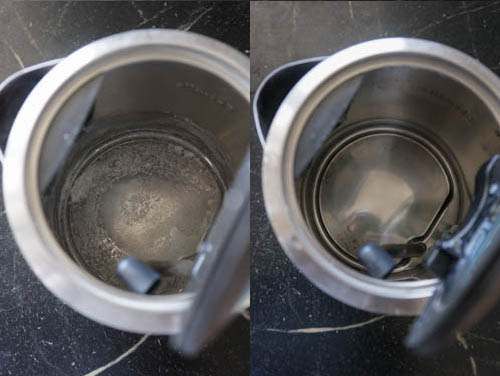
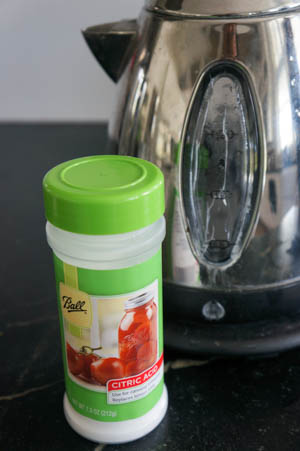
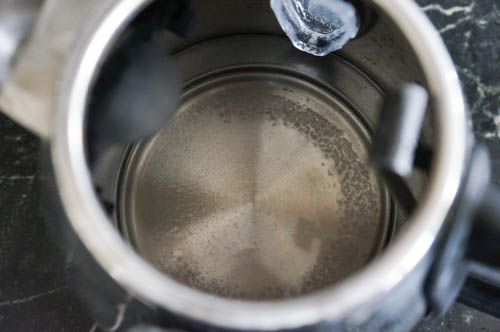
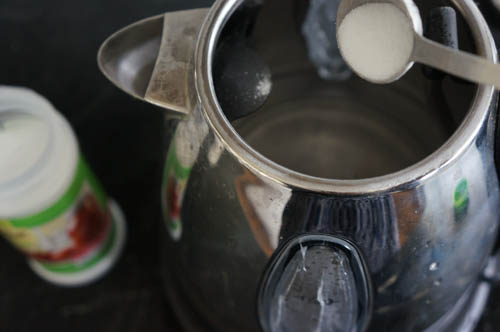
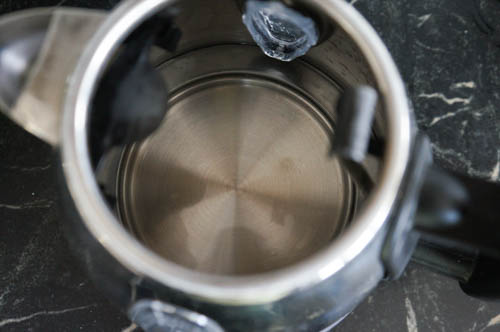




I love it! Thanks for sharing the wealth of this little gem. Knowledge is power! 🙂
I never thought of using citric acid! CG, once again, you have taught me something seemingly small, but really kinda-sorta life changing! 🙂
I was just looking inside my kettle two days ago thinking how unappealing the bottom looks. Your article came right in time! I can’t wait to try the citric acid trick. Thanks so much for the tip!
Can I use the Ball citric acid in my dishwasher and clothes washer?
Thanks for tea kettle tip…!
hi melinda, i am soooo late replying to you! yes, you can use citric acid in dishwasher too…https://www.hunker.com/13419537/how-to-clean-a-dishwasher-with-citric-acid and washing machine…https://www.hunker.com/12002559/cleaning-a-washing-machine-with-citric-acid. thank you for asking!